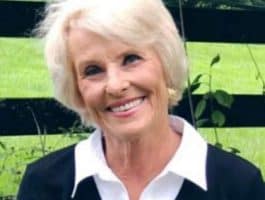
What Do I Do With My Loneliness?
On today's broadcast, author Barbara Rainey, a mother of six adult children, and Susan Yates, an author and mother of five adult children, share their personal experiences about entering the empty nest. Hear them talk about the loneliness they felt as they tried to adjust to this new chapter in their lives.
Show Notes
About the Host
About the Guest
-
On today's broadcast, author Barbara Rainey, a mother of six adult children, and Susan Yates, an author and mother of five adult children, share their personal experiences about entering the empty nest. Hear them talk about the loneliness they felt as they tried to adjust to this new chapter in their lives.
-
Dave and Ann Wilson
Dave and Ann Wilson are hosts of FamilyLife Today®, FamilyLife’s nationally-syndicated radio program. Dave and Ann have been married for more than 38 years and have spent the last 33 teaching and mentoring couples and parents across the country. They have been featured speakers at FamilyLife’s Weekend to Remember® marriage getaway since 1993 and have also hosted their own marriage conferences across the country. Cofounders of Kensington Church—a national, multicampus church that hosts more than 14,000 visitors every weekend—the Wilsons are the creative force behind DVD teaching series Rock Your Marriage and The Survival Guide To Parenting, as well as authors of the recently released book Vertical Marriage (Zondervan, 2019). Dave is a graduate of the International School of Theology, where he received a Master of Divinity degree. A Ball State University Hall of Fame quarterback, Dave served the Detroit Lions as chaplain for 33 years. Ann attended the University of Kentucky. She has been active alongside Dave in ministry as a speaker, writer, small-group leader, and mentor to countless wives of professional athletes. The Wilsons live in the Detroit area. They have three grown sons, CJ, Austin, and Cody, three daughters-in-law, and a growing number of grandchildren.
-

Barbara Rainey
After graduating from the University of Arkansas with a Bachelor of Arts degree in history, Barbara joined the staff of Cru® in 1971. With her husband Dennis, whom she married in 1972, the Rainey’s cofounded FamilyLife®, a ministry committed to helping marriages and families survive and thrive in our generation. Barbara is a frequent speaker and guest on FamilyLife Today®, FamilyLife’s award-winning nationally-syndicated daily radio broadcast. She is the author or coauthor of...more
Susan Yates
Susan Yates has written 15 books and speaks both nationally and internationally on the subjects of marriage, parenting, and faith issues. Her books include And Then I Had Kids: Encouragement for Mothers of Young Children; And Then I Had Teenagers: Encouragement for Parents of Teens and Preteens; Barbara and Susan’s Guide to the Empty Nest (with friend Barbara Rainey) and Raising Kids with Character That Lasts (With her husband John). Her two new books are...more
Barbara Rainey and Susan Yates share their personal experiences about entering the empty nest.
What Do I Do With My Loneliness?
Bob: … have written a wonderful new book …
Dennis: Thank you, Bob.
(laughter)
Bob: … called Barbara and Susan's Guide to the Empty Nest, which kind of establishes them as the empty nest women, doesn't it?
Dennis: I'll let you say that, I'm not going to.
(laughter)
Well, we are joined in the studio by my wife, Barbara; and Susan Yates joins us. Welcome back, Susan.
Susan: Thanks.
Dennis: You mentioned Barbara as the empty nest woman …
Bob: One of the empty nest women.
Dennis: That's right, she is not alone. Did you know that 78 million baby-boomers are already in the empty nest or will be? This is a huge number of people that are experiencing this time when the little birds do grow up, and they fly away, and they leave the nest. This article I was reading was talking about when do you sell the empty nest?
Well, there might be a time to downsize in terms of the house, but I think the empty nest can be a time to really supersize the life; and that's what Barbara and Susan are talking about in their book, Barbara and Susan's Guide to the Empty Nest.
Susan, I want to ask you about this. You and John speak at our Weekend to Remember® marriage conferences. You've interacted with a lot of women around the country, you speaking at women's groups as well. There are a lot of issues that really converge upon women as they move toward the empty nest. What are some of those issues?
Susan: Boy, you are so right, Dennis; because it's a messy season in our life. It's not neat. It's not tidy. There are a number of issues that Barbara and I have identified – your age has an impact when you hit the empty nest.
Dennis: What do you mean by that?
Susan: Well, do you hit it at 60? Do you hit it at 50? For some who are post- planning childbearing years, it's even later, and that impacts how you are physically.
Are you struggling with menopause at the same time that you're hitting the empty nest? Or have you already been through that? What about your parents' health? Some are hitting the empty nest and at the same time that they are sending their kids off, they are also caring for elderly or ill parents. So there are a whole lot of things that impact the empty nest.
Bob: Barbara, what were some of the ones that made it a complicated season for you? Do you remember?
Barbara: Well, yes, there were a number of them. One of the ones that I found from other women that was also one that I identified with is the number of children that you raised. If you had an only child, your experience will be different transitioning into the empty nest. We had six and that made my transition a little more gradual rather than so abrupt.
Another one that many women expressed was the whole idea of their husband's expectations of them or lack of expectations. Some husbands have absolutely nothing to say about what they're looking forward to or what they're thinking about regarding the future.
Other husbands have a lot to say. They are saying things like, "I get my girlfriend back; I get my wife back; I can't wait to do things with her."
Dennis: Amen.
[laughter]
Bob: Is that what you were saying?
Dennis: Absolutely.
Barbara: Yes, he did.
Dennis: I thought it was going to be a piece of cake. I thought, "Oh, this is going to be great. I get my wife back."
Bob: “It's the teenage years all over again.” Is that what you're thinking?
Dennis: No, I wasn't thinking that; but I do remember the transition when Barbara and I moved from no children to having children. They came pretty rapidly there over a 10-year period. As Barbara mentioned, we had six; and I was sharing the love of my life with these six children.
Well, as they began to leave, I fully anticipated that, "Hey," as Susan said, "I'm getting my girlfriend back." I thought it was going to be a lot of fun and “party hard”; but it was harder. It was more difficult than I anticipated because so much of our lives had been defined around our children. That doesn't mean that was our total identity, but you can't raise six children to adulthood without spending a lot of emotional energy on them.
Bob: Barbara, did you know that Dennis had in the back of his mind that as soon as these kids were gone, “It's you and me, baby; and we'll have our lives back together"?
Barbara: It wasn't in the back of his mind, Bob.
[laughter]
It was on the tip of his tongue because he spoke that expectation to me, you know; and I was excited about it. I was looking forward to it because we had a great time when we were dating and newlyweds before we had kids. But I knew that it was going to be very different, and you can't just change like that. You can't just flip a switch.
Dennis: I think men look at their wives; and I think they think, "This is going to be great. The kids are going to leave." In fact, I gave the illustration for probably two or three years that when we took Laura to college, I was going to cry with her, I was going to weep with her as I said goodbye and we launched her out to the college campus, and then we were going to hug her and cry some more and say goodbye and wave, and drive around the corner.
I was going to stop the car. I was going to put it in park, and I was going to get out of the car and walk around to the front of the car and click—jump up in the air and click my heels together, if I still could at that point. Just as a sign of going, “Yee-hee! You know what? We've got a new season here!” But you know what? We had a new season; I just didn't realize all that was wrapped up in that season.
Bob: One of the dominant things that is wrapped up in that season is a profound sense, for a lot of women, of loneliness. That's got to hit virtually every woman as she moves into the empty nest because a big part of what's been at the core of her life is now—not gone—but very different.
Barbara: Very different because her world revolved around those kids for so many years. Even if she had a full-time job and a career, the children were never far from her mind. All mothers know it's a 24/7 job; so it doesn't really matter if you were a full-time, stay-at-home mom, and you homeschooled, or if you had kids, and you had a full-time job—those children were on your mind all the time.
When they leave, and they're not there, there is a real adjustment that has to take place because you may be thinking about them a lot; but they're not there. You can't check on them, and you don't know what they're doing, and you don't know where they are, and you don't know who they're with. That sense of not knowing, of not being connected like you once were, leaves you feeling very lonely.
Another thing that a lot of women feel in addition to loneliness, that I think magnifies the loneliness, is we don't feel needed anymore. I think that's part of why we feel that loneliness because it's like, "Okay, what do I do now? I had these people who were so dependent on me.”
We discovered, Susan and I have, that we, in turn, became dependent on them because of this needing-each-other relationship. When they leave, we're wondering, "Okay, now what do I do? Now what am I good at? How do I use my time? Where do I go? Who do I talk to?"
Bob: Susan, I've always thought that when the kids leave, stuff around the house would get a whole lot easier because there's not as much mess being made, not as much laundry being done, not as much activity – it just wouldn't get as dirty and keeping up with the house would be a whole lot easier. You found the opposite was true.
Susan: You know, I did. I think, as mothers, we are created in many ways by God to multi-task. We have to! Just being a mother means being a multi-tasker. I remember cooking in the kitchen, or cleaning out a kitchen cabinet, or preparing a meal while the kids did homework at the table.
So you were sort of doing two things at once. But then to clean out a kitchen cabinet or to cook a meal, it was just one thing; and it was lonely.
Dennis: And there wasn't anybody there to cheer you on.
Susan: Right, there was nobody there to rave or cheer you on; and I noticed this when I was …
Dennis: Is that why a lot of empty-nest moms stop cooking?
[laughter]
Barbara: I knew that was coming.
Susan: Yes, Barbara and I know you and John have really suffered through us working on this book.
[laughter]
Barbara: Well, it was one of the symptoms for me because I really have not—it is true. I had to cook because I had to feed so many people.
Susan: Well, we had to set a good example; and we had to make nutritional meals.
Barbara: Exactly.
Susan: We no longer have to set good examples. We can eat junk food!
Bob: It is harder to make a meal for two than it is to make a meal for four. Most recipes are a portion for four.
Dennis: Remember, Bob, the chicken biscuit and peas [laughter] that Barbara made?
Bob: The famous four-day chicken biscuits and peas. Right?
Barbara: I don’t make that anymore because it would last eight days now.
Bob: But both of you, in addition to having your kids, you've got a network of friends. I mean, you're a pastor's wife. You've got a lot of women in your life, a lot of women you've discipled and spent time with and poured into.
Barbara, you've got a lot of friends, a lot of women you're connected to. Doesn't that fill up some of the empty places, the loneliness?
Susan: It does; but, you know, I'll tell you a little story that illustrates this in terms of how this book actually came about. Barbara and a friend of ours, Mary Jensen, and I went on a walk at a conference a few years ago. We knew each other not at a deep level; but we were also in the empty nest season at various stages. As we walked, we just threw out the question, “What has been a theme in your life that past year?” We were just sort of trying to catch up because we hadn't really seen each other for a year.
It became obviously clear to all three of us that we were all lonely. Although we were all very busy people with lots of acquaintances in our life, we were lonely at the core for someone just to go really deeper with. I think it was sort of an aha! moment for us because we realized, "Gosh, if we feel this way, there's an awful lot of other women out there that feel that way.” Do you remember that walk?
Barbara: I do, yes, I do, very well. I think part of it, too, in addition to that, is that the friends that we have, and so many women have, are in lots of different stages. I have a number of friends here locally who aren't empty nesters yet. They still have kids at home; and so whereas we had a natural avenue for relationship before when my kids were also home, we had things we could talk about and carpools we did together and all of that.
When the kids are gone and my three friends in the neighborhood all still have their kids at home, we don't have that natural avenue for connection, and I just didn't see them anymore. It absolutely dries up. That's part of the issue—is that even though a lot of us may have a lot of friends and acquaintances, when so much of your relationship revolves around children, when the kids are gone, all of that automatic stuff you had in common vaporizes.
Bob: You know, as you're describing this, let me see if this is making sense because I'm kind of going, “Aha, yeah, I see what you're talking about.” When you're raising your kids, and you're interacting with other women, you know about each other's lives; but I don't know how much you really know about each other.
Barbara: Correct, that's good.
Bob: When the kids are gone, lives change, and now it's, “Who really knows me?” That may be where some of the loneliness comes in because there's really nothing left to relate around because it's all been about our stuff and not as much about us.
Barbara: Well, and it was mostly all about our children: “How are you raising your children; what are you teaching your children; what books have you read that have been helpful; what are you doing about curfew; what are you doing about spanking?” I mean, the whole gamut of parenting was the realm in which we operated with other women. When you take that away—but, you're right in expressing it—that's the core of the loneliness because it's been about our task, it's been about our job, it's been about our career. When that's removed, that's the source of the loneliness is, "Well, who really knows me?"
Susan: And, you know, it's been really interesting because we have found this equally true of the woman who stays at home or perhaps homeschools, who has been totally involved with their children; and exactly the same truth applies to the woman who has worked full-time outside the home. It doesn't seem to make a difference; they still feel that lonely void.
Bob: You'd think that a woman who is working outside the home still has, again, the work environment—she's got a lot to keep her busy and keep her mind occupied. Why is she feeling lonely?
Susan: I think, again, because—even though she's worked outside the home, her primary identity has still been “Mom.” That's my primary identity. I think there is some truth in that she does have an easier time of adjustment because she is busy, and she has tasks, and she has accomplishments.
Dennis: But don't you think that could be dangerous as well? She might not ever really get into the meaningful discussions that we're talking about here because she's busy. She may not have time to go deep with some friends to really hammer out what the adventure is all about from here forward.
Susan: That's a very good point; and that's what we want to encourage these women to do—is not to see this as, "Oh, woe is me, now I'm lonely," but "Oh, my goodness! Now I have the time, in a way, to start over and go deeper with women in an intentional way, deeper, perhaps than I ever have in my whole life."
Dennis: I know that, for both of you, you kind of wanted to write a book that would be the equivalent of what Bob Buford wrote for men. He wrote a book called Halftime. Of course, Halftime is the sports metaphor for a break in the action between the first half and the second half and redefining your life for the second half and living a purposeful life. That, really, was what you two wanted to do as you wrote this book was write a Halftime book for women. Is that right?
Barbara: Yes, that's really true because we are realizing, as we did the research, that as you mentioned at the beginning, that there are millions of women—literally, millions of women who are in our season of life, who are between 40 and 60, who either are empty nesters or soon will be. It's a new generation where most of us are healthier, most of us have more resources and more time, and will live longer than our parents’ and grandparents’ generations.
We will have the opportunity to have a second career—to have a second life, so to speak, giving our lives to something else after our kids are gone. So we want to challenge women to consider that and not just ease into whatever happens to be around the corner but to really think it through.
Bob: Barbara, as you described the feeling of loneliness that comes during this season, you talked about there being a loss of identity, a loss of confidence, a loss of motivation. Unpack some of that. What's going on?
Barbara: Well, I think, again, what it is for us who are mothers and we've raised our children—that role, that job of taking care of those little people, whether it was one or two or five or six or more, was our reason for existing. It became the thing that got us out of bed every morning. I mean, there were many times when our kids were little and we wished they wouldn't get us out of bed in the morning because we wanted to sleep in; but they got us out of bed every morning.
And so when you do that for that many years, that becomes who you are. It's an interesting transition that we experienced as mothers because our children need us; but then slowly, subtly, over the years, we realize that—and we see this as empty nesters—I didn't see it at the time, and I don't know that Susan would say she did, either. In hindsight, we realize we needed them, too, because they gave meaning to our existence. They gave meaning to all the cooking, and all the laundry, and all the things that we had to do. We were doing it for a noble cause because we were raising the next generation.
Their existence fueled my identity and helped me feel like what I was doing—all the menial tasks—made it feel like it was really important. So my identity became wrapped up in who my children were, and who they were becoming, and what I was doing day in and day out. And so when the kids leave, our position goes with them.
Bob: We've already said that this issue of loneliness can be dominant during this time. If you were coaching a mom who is either headed in that direction or is already there and saying, "You've got to get a band of sisters—“ I don't know how else to say it, but, “some other women who know you and know the interior of your life.”
A mom goes, "That seems scary to me. Walk me through that process of connecting with those women."
Susan: That's a great question. I think the first step is simply to realize that they're normal in feeling lonely and they're not the only one that feels lonely. Actually, in the book, we give seven tips to re-engaging with other women. The first one is simply to pray—pray for God to give you a good friend, and pray that you'll be a good friend to other women.
Then, secondly, which is the hard one, is to take the first step. What that might look like, Bob, is calling up a woman that you know just a little bit and saying, "Hey, I'd love to go for a walk," or "I'd love to have coffee at Starbuck's."
You think, “What are we going to talk about?” We have found it really helpful to think in terms of two words that are great conversation breakers. One is relationships, and one is schedules. A relationship question might be, “You know, tell me about your family,” or “Tell me about someone who has meant a lot to you, has been a model to you your whole life.” “Who do you spend time with on vacations?” Those are relationship questions.
A schedule question might be, “What is a typical week like for you? Are you working part-time? What are your hobbies?” Those are schedule questions.
You keep at it until you have spent time with two or three women; and then, I think, out of that will grow a new friendship.
Bob: Barbara, if you're going to do that, you've got to be open. You've got to be ready to peel back some of what's in your own life and say, "I'd like a relationship that doesn't just stay on the surface."
Barbara: Yes, and I think that's what is part of the adjustment for so many of us is that we're taken back by the loneliness and the emotions that we're feeling; and so we've become paralyzed and isolated, and we kind of don't know what to do. I think these suggestions are really healthy.
Another way to do it would be to get two or three women who all had students in the same school as your last child and say, “Let's all go get coffee and talk about what's happening with your child at school, and yours that's in the service, and how we're all feeling about it." It doesn't even have to be something that goes on after that one initial meeting, but just taking the initiative with some other women who you know are in your same season of life can be very encouraging to them and to you as well.
Dennis: There's an interesting passage in Ecclesiastes 3 where it talks about there are seasons in life—you know, a time to love and a time to hate, a time to keep and a time to cast away, and it just goes through all these contrasts back and forth.
Well, the empty nest is a new season. It's a time to do some inventory, a time to not withdraw but instead to reach out, and then to begin to make some plans and to begin to get some hills to conquer, and to decide, “What does God have for me?”
I personally believe that what your book is going to do for a lot of women is not only capture that emotional state where they are, but it's going to cast a vision for what their lives can become. Personally, I believe one of the greatest agents for change that God placed on the planet is women. There are a lot of great things that have been accomplished by women when they become passionate and visionary and begin to experience the adventure for which God designed them.
Bob: And there is some expanded capacity for women in this season of life that they can devote to Kingdom work. In fact, you guys talk a lot about that in the book. Again, we want to encourage listeners, “Get a copy of Barbara and Susan’s Guide to the Empty Nest so that you can begin to prepare yourself for what you are going to experience emotionally, but also so you can begin to reposition your life and re-prioritize your life for the chapter that God has ahead for you.”
Again, go to FamilyLifeToday.com for more information about Barbara and Susan’s Guide to the Empty Nest. The website again is FamilyLifeToday.com; or call toll-free at 1-800-358-6329 and order a copy. That is 1-800-358-6329 which is also 1-800-“F” as in family, “L” as in life, and then the word TODAY. Ask for a copy of the book Barbara and Susan’s Guide to the Empty Nest. We will let you know how you can get a copy sent to you.
Well, we are in the final couple of weeks here in the month of May; and we are hoping that over the next two weeks we are going to hear from a lot of listeners so that we will be able to take full advantage of the matching-gift opportunity that was presented to us back a few weeks ago. We had some friends of the ministry who came to us and said, “We would like to help FamilyLife out, especially as you head toward the summer months.”
These folks know that during the summer we will often see a decrease in the donations to the ministry. They said, “Let’s try and get ahead of the wave here.” They agreed that they would match every donation that we receive during the month of May on a dollar-for-dollar basis, up to a total of $750,000, which by the way is the largest matching gift that we have ever received outside of December.
We said, “It is going to be a stretch because we know folks are busy in May and they have things going on; but we will go to our listeners and see if we can encourage folks to make a $20-, or $30-, or $50-, or $100-, or $200-donation, whatever they can do to help support FamilyLife Today.” When you do that, the donation is going to be matched dollar-for-dollar. We still have a ways to go to get to our $750,000 goal, and that is why we are asking you to do whatever you can do either online at FamilyLifeToday.com or when you call 1-800-FLTODAY.
Make a donation and support the ministry of FamilyLifeToday. Keep it on the air on this station and on our network of stations all across the country. Let me just say, “Thanks,” in advance for whatever you are able to do. We appreciate your generosity and your financial support of this ministry. It means a lot to us.
We want to encourage you to be back with us again tomorrow when we talk about the emotions that often come as a mom enters into this season of the empty nest—things like depression, or grief, or a sense of loss—coping with that. Barbara Rainey and Susan Yates are going to be back with us tomorrow. Hope you will be back as well.
I want to thank our engineer today, Keith Lynch, and our entire broadcast production team on behalf of our host, Dennis Rainey; I'm Bob Lepine. We will see you back tomorrow with another edition of FamilyLife Today.
FamilyLife Today is a production of FamilyLife of Little Rock, Arkansas.
Help for today. Hope for tomorrow.
We are so happy to provide these transcripts. However, there is a cost to produce them for our website. If you've benefited from the broadcast transcripts, would you consider donating today to help defray the costs?
Copyright © 2011 FamilyLife. All rights reserved.
www.FamilyLife.com





